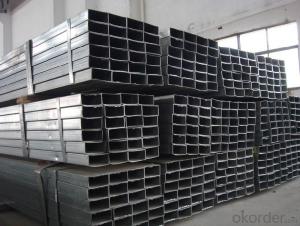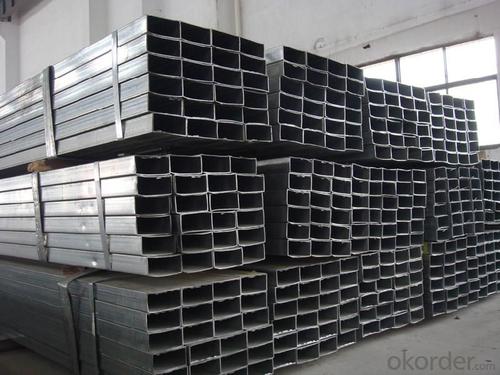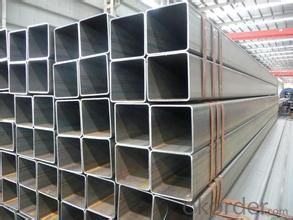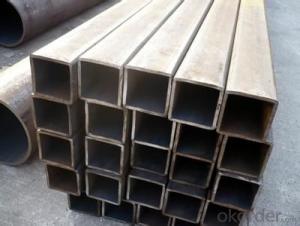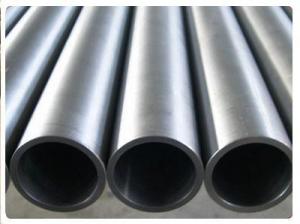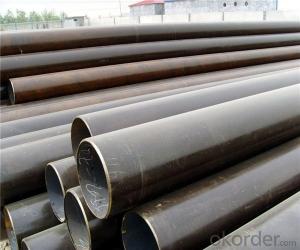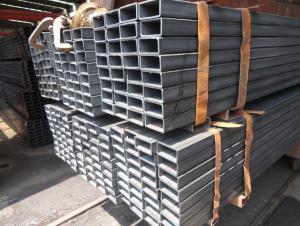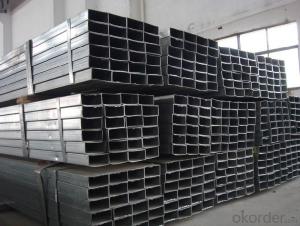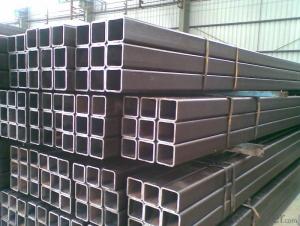Square Pipe And Rectangular Pipe with Good Quality
- Loading Port:
- Tianjin
- Payment Terms:
- TT OR LC
- Min Order Qty:
- 25 m.t.
- Supply Capability:
- 8000 m.t./month
OKorder Service Pledge
OKorder Financial Service
You Might Also Like
1、Structure of Square Pipe And Rectangular Pipe with Good Quality:
To be used for construction, furniture structures as well as other fabrication purposes.
2、Main Features of Square Pipe And Rectangular Pipe with Good Quality:
• High manufacturing accuracy
• High strength
• Small inertia resistance
• Strong heat dissipation ability
• Good visual effect
• Reasonable price
3、Square Pipe And Rectangular Pipe with Good Quality Specification:
Standard | ASTM A500, GB6728 |
Grade | A, B, C, Q195, Q235, Q215 |
Thickness | 0.6-10MM |
Section Shape | Square |
Outer Diameter | 10*10-500*500 |
Place of Origin | TIANJIN, China (Mainland) |
Secondary Or Not | Non-secondary |
Application | Hydraulic Pipe |
Technique | HOT-ROLLED |
Certification | CO, MTC, CI, PL |
Surface Treatment | factory state or painted black |
Special Pipe | |
Alloy Or Not | Non-alloy |
Length | 5-12M |
Outer Diameter | 10*10-500*500 |
1) Material: A, B, C, Q195, Q235, Q215
2) Specification range: 10*10-500*500 WT:0.6-10MM ,length:6-12m or according to the requirement of clients.
3) Excutive standards:GB,ASME API5L.ASTM A 106/A53,Despite of the above standards,we can also supply seamless steel pipe with standard of DIN,JIS,and so on,and also develop new products according to the requirements of our clients!
4) Surface:black lacquered,varnish coating or galvanized.
5) Ends:Beveled or square cut,plastic capped,painted.
6) Packing:bundles wrapped with strong steel strip,seaworthy packing.
4、Packaging & Delivery
Packaging Details: | seaworthy package,bundles wrapped with strong steel strip |
Delivery Detail: | 15-30days after received 30%TT |
5、FAQ of Square Pipe And Rectangular Pipe with Good Quality:
①How is the quality of your products?
Our products are manufactured strictly according to national and internaional standard, and we take a test
on every pipe before delivered out. If you want see our quality certifications and all kinds of testing report, please just ask us for it.
Guaranteed: If products’ quality don’t accord to discription as we give or the promise before you place order, we promise 100% refund.
②How about price?
Yes, we are factory and be able to give you lowest price below market one, and we have a policy that “ for saving time and absolutely honest business attitude, we quote as lowest as possible for any customer, and discount can be given according to quantity”,if you like bargain and factory price is not low enough as you think, just don’t waste your time.Please trust the quotation we would give you, it is professional one.
③Why should you chose us?
Chose happens because of quality, then price, We can give you both.Additionally, we can also offer professional products inquiry, products knowledge train(for agents), smooth goods delivery, exellent customer solution proposals.Our service formula: good quality+good price+good service=customer’s trust
SGS test is available, customer inspection before shipping is welcome, third party inspection is no problem.
6、Square Pipe And Rectangular Pipe with Good Quality Images:
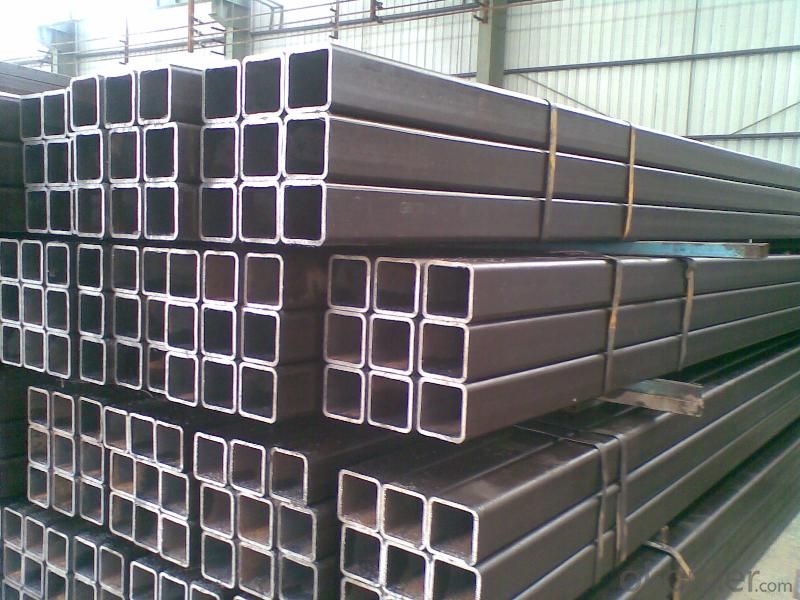
- Q: What are the factors that affect the price of steel pipes?
- The factors that affect the price of steel pipes include the cost of raw materials, such as iron ore and coal, as well as the demand and supply dynamics in the steel industry. Other factors include labor costs, energy prices, transportation costs, and any taxes or tariffs imposed on steel imports. Additionally, market conditions, global economic trends, and government regulations can also influence the price of steel pipes.
- Q: Are steel pipes suitable for underground drainage systems?
- Indeed, steel pipes prove to be a fitting choice for underground drainage systems. The multitude of qualities possessed by steel pipes contributes to their popularity in this field. Firstly, their robustness and endurance enable them to withstand high levels of pressure and heavy loads. Moreover, steel pipes are resistant to corrosion, which prolongs their lifespan and reduces the need for frequent maintenance or replacement. Furthermore, steel pipes possess the advantage of adaptability and versatility in various soil conditions. They can be easily customized to match the specific requirements of the drainage system, encompassing different diameters and lengths. Additionally, steel pipes can be welded together, ensuring a secure and tight connection that effectively prevents leakage and the infiltration of groundwater. Another benefit of utilizing steel pipes in underground drainage systems lies in their capability to handle a wide range of temperatures. Their resistance to extreme heat or cold renders them suitable for diverse climates and environments. Nevertheless, it is important to acknowledge that steel pipes can be more costly compared to alternative materials such as PVC or HDPE pipes. Additionally, their weight and installation process may pose challenges, necessitating specialized equipment and expertise. In conclusion, steel pipes provide a dependable and long-lasting solution for underground drainage systems, particularly in regions where durability and strength are vital considerations.
- Q: What are the different methods of pipe threading for steel pipes?
- There are three main methods of pipe threading for steel pipes: manual threading, machine threading, and roll grooving. Manual threading involves using a handheld threader to create threads on the pipe. Machine threading is done using a power-driven threading machine that automates the threading process. Roll grooving is another method where grooves are formed on the pipe by using a specialized machine, which allows for the connection of pipes using mechanical couplings. Each method has its advantages and is chosen based on the specific requirements and preferences of the project.
- Q: How are steel pipes protected against chemical corrosion?
- Steel pipes are protected against chemical corrosion through various methods such as applying protective coatings like epoxy or polyethylene, using sacrificial anodes, cathodic protection systems, or employing corrosion inhibitors in the pipeline system.
- Q: What are the different types of pipe connections used with steel pipes?
- There are several types of pipe connections commonly used with steel pipes. Some of the most common types include: 1. Threaded connections: These connections involve threading the ends of the pipe and using threaded fittings to connect them. This type of connection is typically used for smaller diameter pipes and is easy to install and dismantle. 2. Welded connections: Welding is a common method used to connect steel pipes. It involves joining the ends of the pipes together by melting the metal and fusing them together. Welded connections are durable and strong, making them suitable for high-pressure applications. 3. Flanged connections: Flanges are used to connect pipes by bolting them together. Flanged connections are commonly used in industrial applications and are often used for larger diameter pipes or when the pipe needs to be easily disassembled for maintenance purposes. 4. Grooved connections: Grooved connections involve using grooved fittings that have grooves on the inside to connect the pipes. These connections are often used in fire protection systems and are quick and easy to install. 5. Compression connections: Compression fittings are used to connect steel pipes by compressing a ferrule onto the pipe. This type of connection is commonly used in plumbing applications and provides a tight and secure seal. 6. Mechanical connections: Mechanical connections, such as couplings or clamps, are used to connect steel pipes without the need for welding or threading. These connections are often used for temporary or emergency repairs. Each type of pipe connection has its advantages and disadvantages, and the choice of connection method will depend on factors such as the application, pipe size, and installation requirements. It is important to carefully consider these factors to ensure a secure and reliable connection for steel pipes.
- Q: What are the different types of steel pipe flanges?
- There are several different types of steel pipe flanges, including slip-on flanges, weld neck flanges, socket weld flanges, threaded flanges, blind flanges, lap joint flanges, and orifice flanges. Each type has its own unique design and purpose, catering to specific applications and requirements in various industries.
- Q: Can steel pipes be used for underground sewer lines?
- Yes, steel pipes can be used for underground sewer lines. Steel pipes are commonly used in sewer systems due to their strength, durability, and resistance to corrosion. They are able to withstand the weight of soil and other external pressures, making them suitable for underground applications. Additionally, steel pipes have a long lifespan and can effectively transport wastewater and sewage for many years. However, it is important to ensure that the steel pipes are properly coated or lined to prevent corrosion and extend their lifespan even further.
- Q: Is the seamless steel pipe used in the market hot or cold drawn?
- Seamless pipe hot rolling, cold rolling, cold drawn three kinds. Among them, the amount of hot rolling, the largest quantity, the price is relatively cheap. Precision, roughness, mechanical properties, cold drawn and cold rolled are better. Of course, the specific use of your requirements, not expensive
- Q: Steel pipe is particularly long, how to clean the inner wall of the pipe so that it can be thoroughly cleaned
- High cleanliness requirements for ultrasonic cleaningUltrasonic cleaning principle: the pressure change of ultrasonic wave propagation in the liquid in the liquid cavitation phenomenon strongly, per second produced millions of tiny gas bubbles, these bubbles rapidly in large pressure under the action of not following the violent explosion, impact force and produce strong suction, enough to make the stubborn dirt quickly stripped.
- Q: What are the different types of steel pipe coatings?
- There are several different types of steel pipe coatings, including epoxy coatings, polyethylene coatings, zinc coatings, and galvanized coatings. These coatings are applied to steel pipes to protect them from corrosion and extend their lifespan.
Send your message to us
Square Pipe And Rectangular Pipe with Good Quality
- Loading Port:
- Tianjin
- Payment Terms:
- TT OR LC
- Min Order Qty:
- 25 m.t.
- Supply Capability:
- 8000 m.t./month
OKorder Service Pledge
OKorder Financial Service
Similar products
Hot products
Hot Searches
Related keywords
